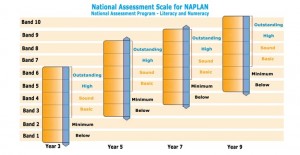Remain calm and read on.
What is NAPLAN? It is a nation-wide testing of all students in years 3, 5, 7 and 9 designed to benchmark your school and your student in Literacy and Numeracy.
Is it a blunt assessment tool?
Basically as blunt as an axe. But even blunt axes chop wood.
On the plus side, the same skills are tested at increasing levels of difficulty every two years of your student’s education. This means you can compare progress over time in each skill area.
Should I be concerned about my child’s results on NAPLAN? Yes and No.
On the one hand the results are only the results on the day of the test. You should look at all the available feedback of your child’s progress. That is, term and semester school reports and parent-teacher interviews, plus results of weekly homework and in-class tests.
In addition to the context of all the available evidence you can also ask your child how they feel they are doing. For younger children this might be along the lines of how much are they enjoying things, what is their favourite, what do they like the least. Older children (from about 7 or 8 years) will be aware of how well they are progressing compared to the rest of the class.
How is English assessed in NAPLAN?
English is called Literacy and is tested in strands: reading, writing and language conventions. Language conventions has two sub-strands: spelling and grammar/punctuation. Everything is marked out of ten.
How do we assess spelling?
In general spelling is split into two skill sets: receptive and expressive. Receptive is where a person can identify correct spelling in a text. Expressive is where a person can spell correctly when creating a text.
NAPLAN testing does not provide as comprehensive a method of testing your child’s spelling as classroom testing probably does. Most primary students are tested weekly for spelling and these results will show you more detail than a NAPLAN score.
What about the windows theory?
No, I don’t mean a computer operating system. I refer to the teacher-talk about the expected time-frames for achieving developmental milestones and academic levels. As a parent I have listened for several years to various experts telling me my child’s difficulties will improve over time. It is indeed difficult for a parent to take a ‘wait and see’ approach; particularly when much research points to the power of early intervention. Often the problems are hard to diagnose early and only when a persistent pattern is established over time can a diagnosis be arrived at.
Trust your parental instinct
If your child is having problems with reading, writing, understanding verbal instructions etc and your parental instinct is kicking in, don’t ignore it. Firstly, eliminate all physical problems by getting hearing and sight checks. Keep a chronological file and see if you identify repeated problems. Make sure all the basics are met regarding a good healthy diet, and regular sleep times. Ask your teacher what you can do to support your child’s learning. Make sure you know exactly what the homework is about and set up a series of short time slots for your child to complete it ahead of time. Check it over with your child so that they know you value their effort.
What if my child just doesn’t like learning/reading/doing homework?
There are two aspects to this issue. First of all, why? Getting to the root cause of the reluctance is important. It could be that the student finds it too difficult and would rather avoid a task than try and fail. If this is the case locating the exact point of difficulty is important so the concepts can be learnt prior to moving on.
Secondly, reluctance can also be brought about by a lack of expectation, routine, and work ethic.
Developing work ethic
Is there something that is easier and more fun than doing homework? If so, can this be set up as a reward for completing the homework? Having free time on the computer for 15 minutes for every hour of homework is reasonable. Rewarding after effort is more effective than rewarding prior to effort.
Developing Expectation and Routine
Where resistance to doing homework has been a problem, parents should get organised, printing up a schedule when homework will be done while a parent is available. Short regular timeslots that do not get changed no matter what work best. The parent doesn’t have to be sitting down with the student but parents should be within sight and checking the homework is done carefully. The TV and any other distractions should be off while homework is being done.
Schedule homework after a snack and before playtime, not late in the evening when everyone is tired. Some families schedule homework for early morning. Do not schedule homework to be completed in parent’s absence – rarely is it done to an acceptable standard. Homework must take priority over every other extra-curricular activity.
Teachers should be setting primary students’ homework once a week. If your child says they didn’t get any, check with the teacher straight away. This lets your child know that you and the teacher have the same expectation. In secondary school, students will have a planner-diary and an assessment calendar. Check in with your student once a week to make sure they are using the diary to keep track of upcoming due dates and working steadily toward completing assignments. There is also a place in the diary to record grades and students should use this to enter each assessment item and track their progress. Spot check this to let your student know you are aware.


Leave a Reply